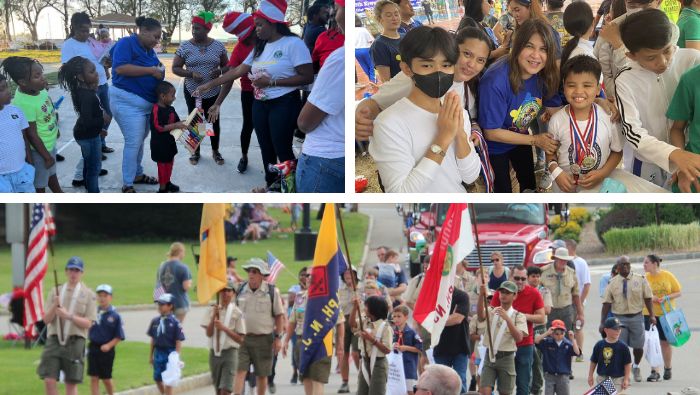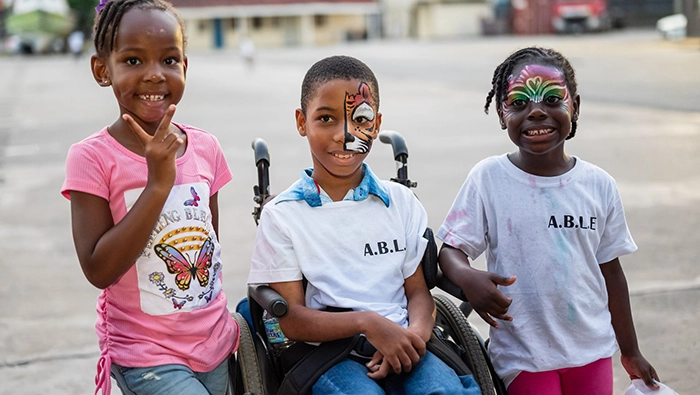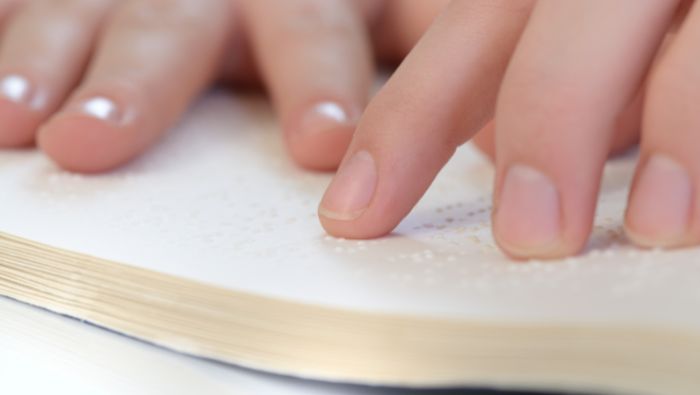
Signature Project Contest Group I finalists announced
Over 500 clubs around the world submitted entries for the 2025 Kiwanis Signature Project Contest.
By Erin Chandler
The top 20 finalists have been selected for consideration in the 2025 Kiwanis Signature Project Contest — 10 for Group I (clubs with 27 or fewer members) and 10 for Group II (clubs with 28 or more members). All of the finalists will be recognized at the Kiwanis International convention in Pittsburgh, Pennsylvania, U.S. The gold, silver and bronze winners will be announced during the convention.
This year, 519 Kiwanis clubs submitted projects that serve kids all over the world. Each Kiwanis district selected its nominees. Members of the Kiwanis International Board of Trustees then reviewed the district winners and selected 10 finalists for each of the two groups.
Below, in alphabetical order according to district, are the finalists from Group I.
Kiwanis Sydney Comfort Care Cases
Kiwanis Club of Sydney, New South Wales, Australia
Australia District
Every year, the Kiwanis Club of Sydney raises funds through a cake stall at a local shopping center, a raffle and a silent auction to support children and families through their most difficult times. The proceeds help to make “comfort care cases” for kids facing end-of-life care at Sydney Children’s Hospital Randwick. The cases include items like mood lights, scent atomizers, soft toys, pillows and blankets to create a comforting, home-like atmosphere for the children; cameras and art supplies to let families create photos, pictures, and hand- and footprints; children’s books that explain the process of death and mourning; teas and coffee for long waits; and other items to help families care for and remember their children. Currently, the club stocks seven cases located in the hospital’s palliative care, oncology, emergency and intensive care wards, and two mobile cases for home visits. Over the past 12 years, Kiwanis comfort care cases have provided solace to 50 kids and families.
Special Education Project, Point Hill Leased Primary School
Kiwanis Club of the First City, St. Catherine, Jamaica
Eastern Canada and the Caribbean District
The Kiwanis Club of the First City, St. Catherine, is addressing the needs of children with learning disabilities by focusing on students at Point Hill Leased Primary School, located in a rural farming community where many experience malnutrition and struggle to access special education resources. The club provides additional educational resources like laptops, speakers, multimedia projectors, smart devices and reading materials for kids whose learning and psychological development benefit from that support. The project also helped expand the school’s breakfast program to include lunch twice a week, promoting focus and healthy brain development. The Innswood High School Key Club helps out with after-school reading classes and additional tutoring. Club members say their dream is “to see this initiative become a national model for inclusive education.”
Ævar bangsi (Ævar the Teddy Bear)
Kiwanis Club of Keflavik-Keilir, Reykjanesbæ, Iceland
Iceland-Faroes District
In 1994, the Kiwanis Club of Keflavik-Keilir donated 100 teddy bears to the Red Cross in Suðurnes, Iceland’s Southern Peninsula, to give to children riding in ambulances. Today, the club continues to provide bears to area ambulances to comfort kids who are sick, injured or in a stressful situation. On his 20th birthday in 2014, the Kiwanis Club of Keflavik-Keilir teddy bear was named Ævar in honor of one of the club’s founding members, Ævar Guðmundsson, who passed away in 2008. Ævar The Teddy Bear has become very popular in his community, and he has travelled all over Europe — even helping out at the European Parliament! Last year alone, approximately 150 children received their own Ævar teddy bears to make their ambulance rides less scary.
Kiwanis Fill the Bus Project
Kiwanis Club of Mt. Juliet, Tennessee, U.S.
Kentucky-Tennessee District
For the past decade, the Wilson County School District’s Family Resource Center (FRC) has relied on the Kiwanis Club of Mt. Juliet’s Fill the Bus Project. The club invites the community to a Wal-Mart parking lot twice a year to fill a school bus with donations of food, school supplies, clothing and toiletries for families referred to the FRC for assistance. As the school district grows, the number of families in need increases. Between 2014 and 2024, the Fill the Bus Project has collected an estimated US$75,000 in supplies that have helped over 1,000 people. According to the FRC’s coordinator, who became a Kiwanian because of the Fill the Bus Project, this drive provides a majority of the supplies distributed each year, and they would have difficulty operating without it.
Kiwanis Malt Shop at the Minnesota State Fair
Kiwanis Club of North Suburban, Saint Paul, Minnesota, U.S.
Minnesota-Dakotas District
For 55 years, the Kiwanis Malt Shop has been a must on to-do lists of Minnesota State Fair attendees — and members of the Kiwanis Club of North Suburban, Saint Paul look forward to it every year, too! During the 12-day fair, club members are joined by the Roseville Key Club and community volunteers in dishing up 15,000-20,000 malts over the course of 230 four-hour shifts. A Kiwanian is always available to answer questions — along with Kiwanis information and membership applications for guests to take with them. Each year, the malt shop raises an average of US$114,000, which the club uses to support a cause — such as Key Club, 4-H, student scholarships and organizations fighting food insecurity — which is chosen based on community need. Malt shop funds have also helped establish five elementary school libraries, install a slide in a park for an underserved community of new refugees, build a Miracle League baseball field for kids with disabilities and much more.
Exeter UFO Festival
Kiwanis Club of Exeter Area, New Hampshire, U.S.
New England and Bermuda District
In 1965, people in and around Exeter, New Hampshire, U.S., witnessed an unidentified flying object — and 60 years later, this local mystery has turned into a festival that benefits the entire community. The Kiwanis Club of Exeter Area’s annual UFO Festival features speakers, panels and activities designed to entertain and educate visitors about the Exeter Incident as well as other UFOs and paranormal phenomena. There are also fun activities like face painting, crafts and games for kids. Visitors can purchase collectible merchandise that features the year’s UFO Festival art, and local stores and restaurants participate with their own special alien- and UFO-themed products. Last year, the festival was attended by 3,000 people and raised US$61,000 for the local YMCA, the Parks and Recreation Department, scholarships, Exeter Hospital children’s cancer programs, community festivals, programs combatting food insecurity and more.
Percussion Instrument Park
Kiwanis Club of Greater Kingston, Washington, U.S.
Pacific Northwest District
The Village Green park in the center of Kingston is alive with the sound of music. The Kiwanis Club of Kingston installed 80 music stations — including chimes, bells, marimbas, babel drums and conga drums — to create a musical playground anyone can enjoy, regardless of age or ability. The instruments are an accessible, easy-to-reach form of play for kids with disabilities, creating a sensory experience through sound and vibration. Teens enjoy jamming to the music they make, as do residents of the nearby senior center. The Boys and Girls Club located on the Village Green visits the park almost daily. When the park was first approved, it was on a one-year probationary basis, in case the noise proved disruptive. By the end of the year, it was clear that enjoying music together only strengthened Kingston’s sense of community.
Mobile Resource Trailer (MRTL — “Myrtle”)
Kiwanis Club of Broomfield North Metro, Colorado, U.S.
Rocky Mountain District
The Kiwanis Club of Broomfield North Metro brings essential supplies where the community needs them most with their Mobile Resource Trailer — MRTL, or Myrtle, for short. Since 2023, the club has held multiple distribution events per year in the parking lots of locations like food banks and schools throughout Broomfield and Adams County. Each distribution event focuses on a theme: winter necessities, basic household essentials, personal hygiene products, or move-in kits for young people transitioning out of foster care. Hundreds of community members have attended Myrtle’s distribution events. For instance, four events in November and December 2024 served 275 people and provided 558 coats to those in need. Each event provides what the club calls “a welcoming, ‘shop at no cost’ approach” that allows each shopper to select what they need and provide feedback to help the club assess needs for future distribution events. The project received a Kiwanis Children’s Fund club grant in 2023.
Nature Warriors: A Kid Learns to Protect Nature
Kiwanis Club of Stunning Davao, Davao City, Davao del Sur, Philippines
Southern Philippine District
Through its Nature Warriors program, the Kiwanis Club of Stunning Davao aims to keep the Philippines’ Davao region stunning — by reaching out to its youngest residents. The club partners with the Department of Education to connect with schools in isolated areas that are in critical need of environmental protection. The visiting Kiwanians distribute bags containing school supplies, dental kits and books on nature to the students; install waste segregation stations; and teach kids how to protect the environment by properly disposing of garbage. The program also includes regular coastal cleanups, and soon the club hopes to partner with a turtle sanctuary to give hands-on lessons on protecting marine life. Each child who benefits from the Nature Warriors program brings what they have learned home with them, spreading the word about responsible environmental stewardship throughout the community.
58th Annual Kiwanis Auction
Kiwanis Club of Olds, Alberta, Canada
Western Canada District
The Kiwanis Club of Olds’ first fundraising auction was held 58 years ago from an outdoor hay rack. Since then, the event has been housed in several locations, growing its participation by moving online in 2020 — although last year’s event included an in-person gathering to thank donors. The auction has raised over CA$750,000 since its inception, and an average of CA$21,763 each year for the last seven years. Proceeds benefit the community in myriad ways, purchasing sports equipment for youth leagues, providing scholarships, funding community events, and sponsoring Scout facilities and 4-H activities. In 2025, auction funds help build a warming shack by an outdoor public ice rink in honor of the club’s 70th anniversary.


